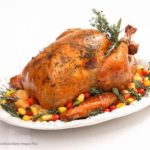Keep pets safe from holiday hazards with these tips from the FDA. There are many smells, sights, and sounds that may be unfamiliar to curious dogs and cats this time of year, and some can be hazardous to your pet's health. Salt dough ornaments and homemade play dough can be fatal to pets if eaten. The high salt content is the concern. Make sure that you warn your children to keep these items away from your dog or cats as well. One cup of salt is 48 teaspoons. A pet that weighs 10 pounds can get sick after eating just 1/2 teaspoon of table salt. A 1-1/2 teaspoon dose can be fatal. Tinsels and ribbons are also problematic. The sparkly and wiggly items look like prey, and they can cause serious stomach and intestinal damage to dogs and cats. Keep tinsel off the tree and collect all … [Read more...]
CDC Offers Holiday Food Safety Tips to Keep You Safe
The Centers for Disease Control and Prevention (CDC) is offering holiday food safety tips. Cooking for a crowd is different from cooking for a family, and your guests may include people who are high risk groups for foodborne illness complications. First, make sure you always cook food thoroughly. Print out cooking temperature charts for meat, poultry, fish, and eggs and post them in your pantry. And always use a reliable and accurate food thermometer to test foods before you serve them. Roasts, chops, steaks, and fresh ham should rest for 3 minutes after they are removed from the grill or oven so the temperature can rise. Remember that the "danger zone" for food is between 40°F and 140°F, where bacteria grow rapidly. In fact, bacterial counts can double every 20 minutes at those … [Read more...]
Holiday Food Safety Tips From the FDA Keeps Your Family Safe
The FDA is offering food safety tips for healthy holidays so you can keep your family safe this season. It's important to follow these tips and to know the signs of food poisoning just in case. Most people sickened with food poisoning suffer with vomiting, diarrhea, abdominal cramps, and symptoms similar to the flu. The illness usually starts hours to days after eating contaminated food. While most people recover without medical treatment, there are some pathogens, most notably Shiga toxin-producing E. coli, that cause serious illness. People who are most at risk for serious complications from food poisoning include the elderly, infants, young children, pregnant women, anyone with a chronic illness, and people with compromised immune systems. To keep your family safe, follow … [Read more...]
Keep Your Fourth of July Celebration Safe With Tips From USDA
Keep your Fourth of July celebration safe with tips on food safety from the USDA. Cooking outside and hosting parties pose unique food safety challenges. Millions of Americans contract some form of food poisoning even year, leading to 3,000 deaths. Before you start preparing food, wash your hands. This is the simplest way to stop the spread of pathogens around your kitchen. Use soap and water and lather for at least 20 seconds. Dry with a clean towel or paper towel. Always wash your hands immediately after you handle meat and poultry. Make sure that you cook all meats, poultry, fish, and egg dishes to safe final internal temperature, and check that temp with a reliable food thermometer. Cuts of beef, pork, lamb, and veal should e cooked to 145°F with a three minute rest time. … [Read more...]
Holiday Food Safety Tips From the CDC Can Help Keep You Safe
The holidays are here, and the Centers for Disease Control and Prevention (CDC) is offering some tips for food safety. At this time of year, food poisoning outbreaks, especially those caused by Clostridium perfringens, can increase. First, wash your hands. Wash them before, during and after preparing food; after touching raw meat or eggs or unwashed produce; before eating or drinking; after using the bathroom; before caring for someone who is ill; and before and after treating a cut or wound. Also wash your hands after blowing your nose, coughing or sneezing; after touching an animal, animal food, or animal waste; and after handling garbage. Another holiday food safety tip: make sure that all of the food you cook is cooked to a safe final internal temperature. All ground meats … [Read more...]
Dispelling Myths for Summer Food Safety
With the summer months approaching and Memorial Day just around the corner, Ben Chapman, a food safety researcher at North Carolina State University, is uncovering food safety myths for summer food safety. What do you need to know to stay safe food-wise this summer? One suspected culprit that many people suspect in summer food poisoning outbreaks is mayonnaise. But mayonnaise is not usually the issue. That product is made with acids that render the food inhospitable to bacteria. When someone thinks they got sick because of potato or chicken salad, it's not the mayonnaise. It's the potatoes or the chicken. In potato salad, the bacteria that most often make people sick are usually Staphylococcus aureus or Clostridium perfringens. Potatoes are a low-acid food. That means they are … [Read more...]
Prevent Food Poisoning This Holiday Season
Center for Science in the Public Interest is helping consumers stay safe and avoid food poisoning this holiday season. Cooking food to safe internal temperatures, avoiding cross-contamination, and handling leftovers properly are all key. For instance, don't eat raw cookie dough. In 2016, an E. coli outbreak that sickened 63 people was linked to General Mills flour. Seventeen people were hospitalized because they were so sick. In that outbreak, three children were sickened when a restaurant gave them raw dough to play with. Never eat raw dough or batter, and be very careful when handling raw flour. In fact, check your pantry now to see if you may have some of the recalled products. Another problematic ingredient is raw cider. Unpasteurized cider is about as risky as raw milk. In … [Read more...]
FDA Offers Tips on Barbecue Food Safety
With the Fourth of July holiday weekend approaching, the FDA is offering tips for preventing foodborne illness at your backyard barbecue. Since bacteria in food multiply faster at temps between 40°F and 140°F, summer heat makes food safety implementation important. First, wash your hands well with soap and water before preparing, serving, and eating food. You should wash them for at least 20 seconds, especially after using the bathroom. If you are at a park or picnic area where there is no bathroom, use a water jug, some soap, and paper towels. Moist towelettes are better than nothing, but soap and water is best. Always keep raw food separated from cooked food. Cross-contamination is a major cause of food poisoning. Don't use a plate that held raw meat, poultry, eggs, or seafood … [Read more...]
Tips for a Safe and Healthy Valentine’s Day Dinner
The Centers for Disease Control and Prevention (CDC) is offering 14 tips for a safe and healthy Valentine's Day dinner, whether you eat out at a restaurant or at home. About 65% of food poisoning outbreaks are traced to food prepared in a restaurant. When you go into a restaurant, first look at the scene. See if certificates are posted that show food safety practices, such as a health inspection score.Make sure that the glasses, silverware, napkins, and tablecloths are clean. Watch out for unlikely sources of sodium. Most sodium comes from breads and rolls, cold cuts, cured meats, pizza, poultry, soups, sandwiches, cheese, pasta dishes, meat dishes, and snacks. Look up nutritional information in advance, since most major restaurant chains post this information online. Always … [Read more...]
Holiday Food Safety for Pregnant Women
FoodSafety.gov is offering food safety tips for pregnant women this holiday season. Pregnant women must always be diligent about food safety, and especially so when attending parties and family gatherings. These women are at higher risk for food poisoning complications, especially listeriosis, the illness caused by Listeria monocytogenes bacteria. A woman's immune system is weaker when she is pregnant, which makes her at greater risk of contracting a foodborne illness. Toxoplasma gondii and Listeria monocytogenes are two of the major pathogens to be concerned about. Listeria bacteria can cause miscarriage, premature delivery, stillbirth, infection in the newborn, or the death of a newborn. And toxoplasma gondii can cause hearing loss, blindness, and intellectual disabilities in … [Read more...]












